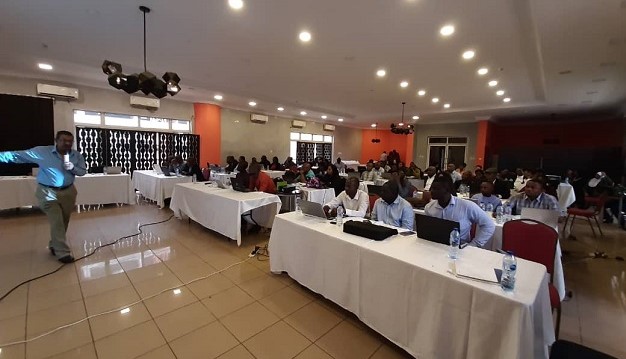For Nigeria to get the needed result in its efforts at reducing to the barest minimum the effect of emission of greenhouse gases (GHGs), there is the need for the Federal Government to invest heavily in the procurement of cleaner technology.

A renowned consultant on climate change, Nayamuth Abdul Razack, disclosed this in an exclusive interview with EnviroNews at a five-day capacity building workshop for National Reporting on the GHG Inventory and Mitigation held in Abuja from August 19 to 23, 2019.
The workshop was put together by the Federal Ministry of Environment in collaboration with the United Nations Framework Convention on Climate Change (UNFCCC) Secretariat and UNDP/UNEP Global Support Programme for National Communications (NCs) and Biennial Update Reports (BURs) with additional support by Food and Agricultural Organisation (FAO).
Explaining the need for adequate funding in order to halt the emission of GHGs, Abdul Razack said: “The thing is that there is the need for funds to do that. There is the need to buy a cleaner technology. It is very expensive. This is why we have all these reporting and the Conference of the Parties, hopefully the pledge made by the developed countries for funds and capacity building and also transfer of technology will be more effective and this will help the developing countries to develop in a more sustainable manner and help correct this problem.”
Speaking on the rationale behind the workshop, the expert said: “Well, you know capacity building, especially on climate change is not an easy issue, it will take time.
“Since Nigeria has taken the decision to shift from giving the job to consultants into doing it in-house within the department of climate change and supported by other federal ministries and institutions, there is the need for collaboration.
“In fact, this is what we call institutional arrangement or greenhouse gas inventory management system which is not easy to settle.
“So, to get everybody to collaborate and sit around the same table, same time and build their capacity technically and to run software and look at the quality of data, the training becomes very important.
“So, we are building up the processes which started last year. There has been the first training and they have been left on their own to continue to implement the work programme that will produce the next official document for Nigeria.
“This session is much more of an assessment and filling the gaps where they still need more capacity building. After this one, we will leave them to continue on their own and probably come back again after a few months.”
While explaining the concept of GHG emission and its causes, the expert said: “Greenhouse gas is responsible for the global warming and disruption in the climate pattern in weather with more intense rain fall, flash floods, sea level rise and all that.
“Now the cause of this, we say is the greenhouse gases. These gases include carbon dioxide, methane and many others.
“Carbon dioxide is mainly from burning of fossil fuel in cars, production of electricity, manufacturing purposes etc including deforestation. This is because the forests are looked upon as store for carbon dioxide and when you cut it and burn it, you are releasing what is in store to the atmosphere.
“So, the carbon dioxide level in the atmosphere is increasing and this increase prevents the heat from going back into the upper atmosphere and stays in the level of lower atmosphere and causes this climate disruption.
“Adding to that, there are certain practices in agriculture like deep tillage where you sent up carbon dioxide, methane which is produced when you get landfills or wastewater that is not treated in extraordinary way.
“We can now say that greenhouse gas is directly or indirectly link practically to all human activities. That is why there is the Convention and Conference of Party each year, but still there is a long way to go.”
Responding to a question on whether Nigeria will soon overcome the GHG emission, Abdul Razach, noted: “I will say in the medium term. Reporting is one thing but implementing the convention and contributing towards reduction of emission is more of a medium and longer term.
“Nigeria has been reporting in the past, this is not the first reporting. Nigeria has adopted what we call the local bon strategy which is being applied now and some other measures, for example, the mass transport system in Lagos where you transport more passengers per unit of greenhouse gas you are emitting, the afforestation programme, the energy efficiency programme.
“I wouldn’t say that we can get things quickly done. This is because Nigeria is not a developed country. Nigeria has its own problems.”
He further said that the Intergovernmental Panel on Climate Change (IPCC) with representatives from all governments is the scientific body that determines how fast and when exactly a country can halt GHG emission.
According to him: “They take all the details. We are working on the report, so they will get the information from all the signatory party to the Convention.
“We are trying to push people to start to reverse the situation as from 2050 and 2060s.
“Now, when we reverse the situation, the effect of the global warming that has happened up to 2050 it will continue for minimum of 30 to 40 years, so if we think of correcting the problem really, it will be in the late 2090. It is a long way ahead and everybody is trying to contribute to get it done.”
